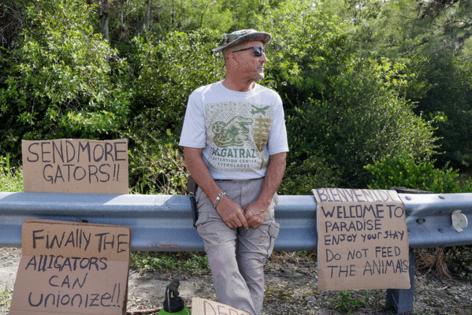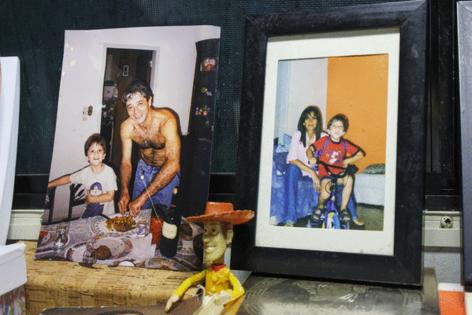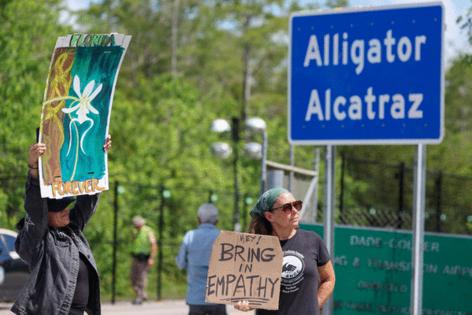Inside Alligator Alcatraz: Detainees describe what it's like right now
Published in News & Features
OCHOPEE, Fla. — One worked in a celebrated restaurant in Miami’s Design District.
Another is an aspiring DJ.
An Italian passport holder was already preparing to leave the U.S.
All three ended up at Alligator Alcatraz, a vast compound of tents and trailers built to hold up to 3,000 migrants deep in the Florida Everglades.
In the weeks since Gov. Ron DeSantis invoked emergency powers to build it, just who is actually in Alligator Alcatraz — and the conditions they encounter — have become contested topics.
While President Donald Trump vowed that the detention center would hold “some of the most vicious people on the planet,” a roster of detainees obtained last week by the Times/Herald revealed that of 700 names listed, more than a third had only immigration violations but no criminal record in the United States.
Last week, Tampa Bay Times reporters visited the detention center — located in Collier County but built at an isolated airstrip that is owned and operated by Miami-Dade County — and spoke by phone to seven detainees or their family members about their arrests and their experiences inside Alligator Alcatraz. Though four of the seven detainees were arrested in Florida and charged with felonies, court records show that many of the charges were dropped. It’s unclear how many were convicted. Some of the family members declined to identify themselves to the Times out of fear they could face deportation.
Here’s what the detainees and their families and friends told us.
—Fernando Eduardo Artese, 63, Broward
Artese was arrested in Jupiter in late June while driving his RV with one goal: to leave the country.
Artese was headed to Colorado with his wife, Mónica Riveira, and their daughter, Carla, he said in a phone interview with the Tampa Bay Times. The plan was to drive through California, cross into Mexico, travel through Central America, and reach Argentina, Artese’s home country.
“We were ready for this,” Artese said.
But on June 25, the police stopped Artese and discovered a warrant was out for his arrest. In March, he had been fined in Broward for driving without a license. He missed his traffic court date because he feared being detained, according to his family.
Artese was taken to the U.S. Customs and Border Protection facility in West Palm Beach on the day of his arrest, he said. Six days later, he was handed over to U.S. Immigration and Customs Enforcement and taken to Alligator Alcatraz.
“This is a concentration camp. They treat us like criminals, it’s a pursuit of humiliation,” Artese said. “We’re all workers and people fighting for our families.”
Before his arrest, Artese spent nearly a decade in the United States. He has Argentine and Italian citizenship. He came in through Spain using his Italian passport under the visa waiver program, which allows short visits of up to 90 days without a visa. He overstayed.
His family followed in 2018. His wife, 62, has a student visa, and their 19-year-old daughter came with her legally. The family lived in Hialeah in Miami-Dade County, where Artese ran a camera installation business. Last year, they moved to a mobile home park in Broward County.
—Nicolás Esbir, 30, Miami
Esbir flew to the United States from Chile on a tourist visa in January 2021. He arrived with his girlfriend, who was fleeing a dangerous personal situation, according to the girlfriend, who asked not to be named.
The couple married in 2022 and requested asylum. While they waited, both paid taxes and obtained work permits and Social Security numbers. They have two U.S.-born daughters.
Esbir was arrested May 22 at the Miami Design District location of El Turco, a Turkish restaurant — recognized by the Michelin Guide — where he works as a chef. He was held at the Turner Guilford Knight Correctional Center longer than a month, his wife said.
Esbir’s wife had filed a temporary order of protection against him in April, she said. They were considering divorcing after a 2024 domestic dispute. Her understanding was that this filing would not lead to his arrest or affect his immigration status.
Esbir had a hearing in late June and should have been released no later than 48 hours later, she said.
Instead, his wife said, he was kept in the jail four days past what should have been his release date until he was moved to the ICE-ERO Center in Miramar on July 2.
Esbir was taken to Alligator Alcatraz the next day.
Gokhan Yuzbasioglu, one of El Turco’s founders, told the Times he wrote a letter advocating for Esbir and described him as a disciplined and skilled worker.
—Jordin Castillo, 43, Miami
Castillo had lived in Miami for nearly two decades before he was detained by immigration officials.
He had built a small business called Jordin Paint, he said. The company allowed him to make a decent living and to give others the opportunity to work.
Castillo had some legal troubles. Miami-Dade court records show felony charges dating back to 2019 for drug possession, which was dropped; a concealed carry violation, with no action taken; and fleeing from police, for which he served six months’ probation.
But his sister, who asked not to be named, described him as a man of good character and a loving brother, friend and dad.
“He’s proud of the life he built,” she said.
Last month, Castillo was arrested on suspicion of habitually driving without a license, court records show.
He was taken to Alligator Alcatraz on July 3.
Six days later, Castillo said, he was handcuffed and left outdoors in the sun as a punishment for attempting to go on a hunger strike inside the detention center, he said in a phone interview. As mosquitoes swarmed him, Castillo pleaded with guards to bring him inside, he said. He was kept outside for nearly three hours.
There are fights between detainees over scarce amounts of food, and COVID-19 cases have spread inside one of the cells, Castillo said.
A spokesperson for the Florida Division of Emergency Management refuted Castillo’s account.
“No guards are harming detainees or leaving them in the sun — that is a lie,” said Stephanie Hartman. “Officers are highly trained and follow all federal and state detention protocols.”
Castillo’s girlfriend, who asked not to be named, said she speaks on the phone daily with Castillo. His booming voice has softened and weakened since he was detained, she said.
—Daniel Muela Gomez, 31, Orlando
Gomez, an employee of Hubbard Construction in Orlando, said he was pulled over for speeding on June 25.
Despite having a work permit, a driver’s license, a Social Security number and paying taxes, Gomez has been detained since this traffic stop, he said.
An extensive background check on Gomez did not turn up any criminal charges in Florida with the name or age he gave the Times.
Gomez said he requested asylum from Ecuador upon arriving in the United States through its southern border. He was working legally while he waited for asylum to play out.
He was eventually hoping to bring his four children to the U.S. so that they could live in a safer country with a better economic situation.
“I came to this country to help my family,” he said.
Inside the detention center, Gomez said guards force detainees to either eat their food during scheduled meal times or throw away what’s not eaten. Saving food for later is not permitted, he said.
Hartman, the spokesperson for the Division of Emergency Services, said food is not used as punishment. She said detainees receive a meal upon arrival and three meals a day.
Gomez said he has developed lung pain inside Alligator Alcatraz, the first time he has ever dealt with such pain in his life.
—Juan Arango Matallana, 26, Miami
Arango Matallana came to the United States from Colombia on a tourist visa in 2019, his relatives told the Times.
He’s a husband and the father of a 3-year-old child. He worked in construction before pursuing a career as a DJ.
Arango Matallana had three arrests in Florida. In September 2022, he was charged in Miami-Dade County with driving without a license and cannabis possession, but the drug charge was dropped, according to state criminal records. That same year, in November, he was arrested in Clay County on a shoplifting charge.
On June 26, he was arrested in Miami-Dade on charges related to driving without a license, drug possession and the outstanding warrant from Clay County. Arango Matallana was first taken to Miramar’s ICE-ERO Center and then to Alligator Alcatraz.
Laura Morales, his wife, said he was among the first detainees there. Morales said guards beat him last week after he demanded better conditions and that he was moved to a different area as punishment.
“He told me the conditions are terrible,” Morales said. “The food is bad and there aren’t enough bathrooms.”
Hartman said there is no physical punishment at the facility.
“Alligator Alcatraz is a well-functioning and fully compliant facility that meets all national standards and is helping to fulfill the critical mission of immigration enforcement,” she said.
—Hairon Lazaro Cueto, 20, Miami
Cueto had his biometrics appointment — an important step toward citizenship — on July 15, according to his friend Gladys Cancio. He entered the United States via humanitarian parole from Cuba nearly three years ago.
During his time living here, Cueto worked in roofing and drove with a learner’s permit. Cueto is a father figure for Cancio’s four children, she said.
Cueto had no criminal record in Florida until he was arrested after a domestic dispute with his brother over a car he had sold to him. Cueto was charged with aggravated assault with a deadly weapon, a felony, on June 30, according to the arrest affidavit. Once in jail, Cueto was told there had been an ICE detainer placed on him, Cancio said. He was held at Miramar’s ICE-ERO Center before becoming one of the first detainees at Alligator Alcatraz.
His brother has filed a statement requesting that the charges against Cueto be dropped, expressing regret about how the situation escalated, Cancio said.
Cueto, born with a lung that works at 10% capacity, said he is suffering inside the facility.
During one meal, Cueto attempted to explain to the guards that he needed more time to finish eating his food because of his condition. The language barrier between the English-speaking guards and the Spanish-speaking Cueto caused his request to be interpreted as insubordination, he said. Cueto said he was struck in the ribs numerous times with a baton-like tool until an English-speaking detainee clarified the situation to guards, Cancio said.
Cueto, Cancio said, is also not receiving the medicine he needs. Cancio has driven to the entrance on U.S. Route 41 and asked officers to deliver the medicine to him. She said she understands that they might not be able to accept the medicine she brings, but that they ought to provide it to Cueto themselves.
Cueto has thrown up blood and contracted COVID-19 while inside the detention center, Cancio said. She worries Cueto is over-exerting his fully functioning lung and that his long-term health will suffer.
—Espejo Hernán Morales, 40, Pompano Beach
Morales, who arrived from Mexico without documentation 25 years ago, was arrested on a misdemeanor domestic violence charge in late May, Broward County records show.
On June 22, Morales called to say he was being taken to Alligator Alcatraz, said Guirlande Guillaume, a U.S. citizen who has three children with Morales. Guillaume was not the victim listed on Morales’ domestic violence charge.
Morales was previously charged with third-degree assault and child abuse without causing great bodily harm in 2018, Florida Department of Law Enforcement records show.
Morales was told he needed an operation to address heart disease in 2023 but could not afford it. He has frequent heart and chest pain that makes it difficult for him to breathe, Guillaume said.
She said she received calls three days this week from someone who identified themselves as an Alligator Alcatraz guard informing her that Morales’ condition had worsened. According to Guillaume, the guard, who told her they could not disclose their identity, urged her to find a way to get Morales out of the detention center but said they could not help.
Morales is struggling to breathe so much that he said he feels as if he were suffocating, said Guillaume.
She is worried he will die before he gets medical attention.
_____
©2025 Tampa Bay Times. Visit tampabay.com. Distributed by Tribune Content Agency, LLC.














Comments